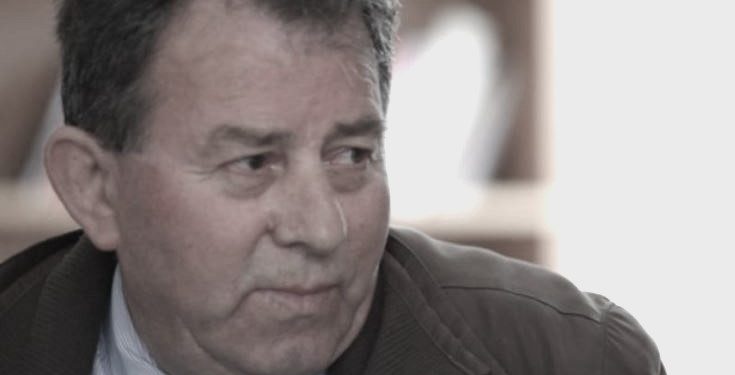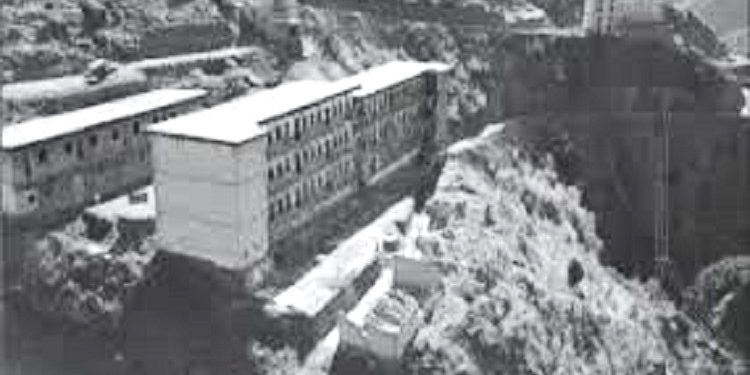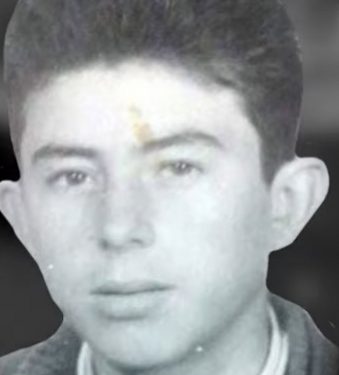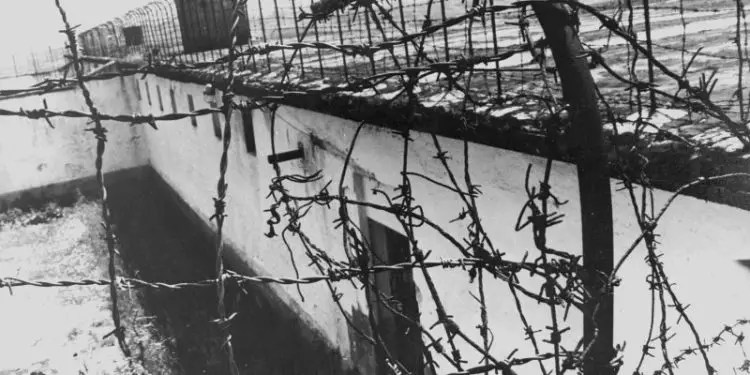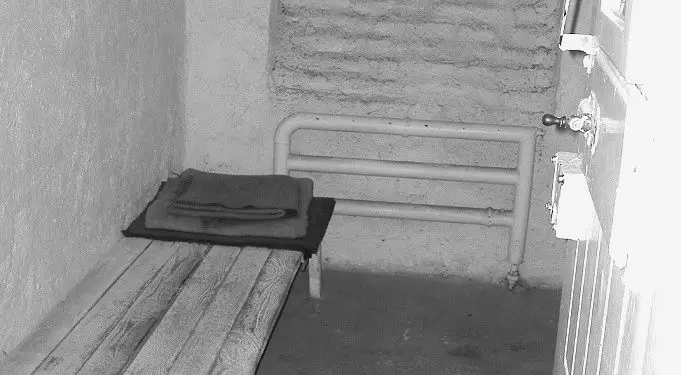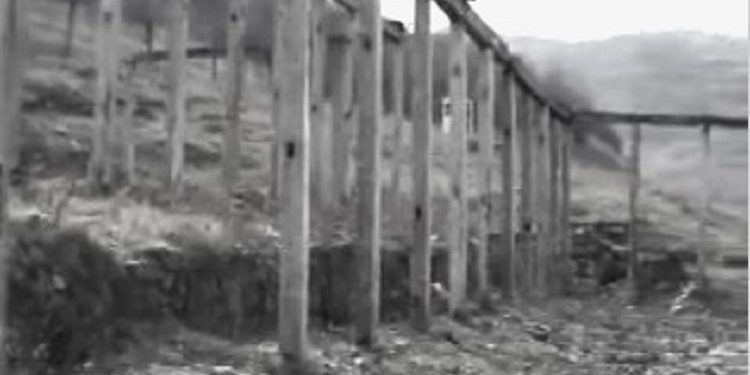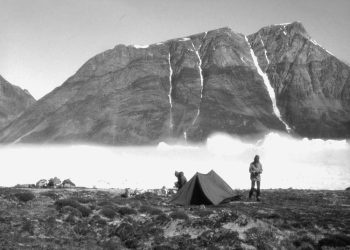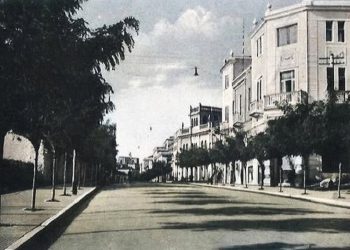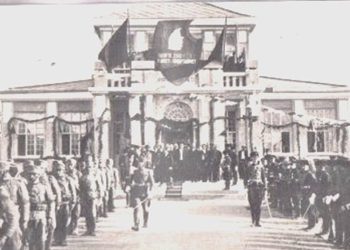By Shkëlqim Abazi
Part fifty-four
Memorie.al / I were born on 23.12.1951, in the black month, of the time of mourning, under the blackest communist regime. On September 23, 1968, the sadistic chief investigator, Llambi Gegeni, the ignorant investigator Shyqyri Çoku, and the cruel prosecutor, Thoma Tutulani, mutilated me at the Internal Affairs Branch in Shkodër, split my head, blinded one eye, deafened one ear, after breaking several ribs, half of my molar teeth, and the thumb of my left hand, on October 23, 1968, they took me to court, where the wretch Faik Minarolli gave me a ten-year political prison sentence. After cutting my sentence in half because I was still a minor, sixteen years old, on November 23, 1968, they took me to the Rrëps political camp, and from there, on September 23, 1970, to the Spaç camp, where on May 23, 1973, in the political prisoners’ revolt, four martyrs were sentenced to death and executed by firing squad: Pal Zefi, Skënder Daja, Hajri Pashaj, and Dervish Bejko.
On June 23, 2013, the Democratic Party lost the elections, a process that is perfectly normal in the democracy we claim to have. But on October 23, 2013, the General Director of the “Rilindas” (Renaissance) Government sent Order No. 2203, dated 23.10.2013, for; The dismissal of a police employee. So, Divine Providence was intertwined with the neo-communist “Rilindas” Providence, and precisely on the 23rd, I was replaced, no more and no less, by the former operative of the Burrel Prison Security. What could be more significant than that?! The former political prisoner is replaced by the former persecutor!
The Author
SHKËLQIM ABAZI
RREPSI
(Forced labor camp)
Memoir
The First Meeting
(The boat sunk in the swamp)
“In cases where the corpse was twitching inside the boundary signs of the “no passing” zone, the police would drag him by the feet until they threw him beyond the boundary; there they would photograph him, draw up the minutes, where they wrote the cause of death: ‘Attempt to escape from the place of serving the sentence.’ Then the bloodied unfortunate would be exposed for a short time in the camp square to terrorize the fellow sufferers; then the body, broken in half, would be crammed into a half-sized coffin and buried in a remote corner. Also included here were the imposed deaths or self-executions.
These could also happen as a result of the soldier’s bullets or by the victim’s own will. However, in both cases, the impetus was physical and psychological violence. The victim, who supposed they had been plunged into a blind alley with no way out, could not find the strength to resist the pressure any longer and made the fatal decision. To achieve the final goal, they could self-select any means, depending on the possibilities and circumstantial conditions. Deadly instruments were not lacking there: the soldier’s bullets could help them, by deliberately circling the wires with full awareness of the consequence; an electrical outlet; a wire thread; a shirt torn into strips and everything else that could replace the rope and ultimately, the victim would be found with their tongue hanging out, swinging from a window grating or a utility pole.
In their absence, they could self-select plunging headfirst from the heights of the investigation rooms’ windows and balconies, from the chimneys or terraces of construction sites, from the furnaces or galleries’ openings, etc. Always, the unfortunate who ended their life in one of these ways would be given the diagnosis ‘with depression’ and with that the chapter would close, to continue then, with others and others. I would also add a somewhat special cause of death, which should in fact belong to the case of natural fatalities, but due to the specificity it carries, I have to classify it as extraordinary.
In political prisons, they would also put old people over eighty years old, the sentences of ten years and more, which they applied to this category, were stratospheric. Just the thought of how much longer their life could last was a lament in itself! Let alone calculating the social danger of these wretches! Consequently, sentences beyond the real limits of physical age were equivalent to a slow and agonizing death sentence. Although the communists justified this with the rigorous application of the law; a law that in their hands took the value of a plasticine ball. Nowhere are the dead punished, or those who are on the verge of the grave! Let’s reason a bit about the peculiarity of death in prisons, from this very process, when it happens somewhere else. A crucial difference is the way this sublime event was treated.
Nowhere in the world, not even in prisons, is death denigrated; on the contrary, the moment of agony of a human being is respected as a solemn moment, regardless of the bearer of this life. If they didn’t release them from prison, to take them to die near their loved ones, at least the expected victim of the scythe of death was provided with a more comfortable environment to breathe their last. Thus, they were sent to a hospital, asylum, or monastery, where they faded away under the care of doctors or monks, under the liturgy of the forgiveness of sins. There, even if medicine had exhausted its means, at least they found the missing spiritual peace. In the prisons of communism, this custom was not respected, it was considered bourgeois, period! Other differences when the fatality occurred were also the way the corpse was treated and the rites that accompanied it.
Shortly after settling in the ‘Wrecks’ barrack, the first death occurred, at least since I had arrived at Reps. I had heard about previous fatalities, but I hadn’t happened to see one myself. But unfortunately, one morning the elderly minority man Jorgji Kote woke up as a corpse. He had fought in agony between life and death all night. Somewhere, at dawn, his soul detached from this world of nightmares and flew to heaven. Even though I was sleeping in the same barrack, I didn’t understand what was happening; after an exhausting day, a leaden sleep had severely overcome me.
As if in a dream, I heard noises during the night. The Orthodox priests across from me were going up and down the wooden stairs, but I was sleeping. I was sleeping the sleep of youth! I put a nickname to their going up and down: ‘Old men’s habits, as they are elderly, they suffer from kidneys and prostates, they go out from time to time to relieve themselves in the latrine!’ That was enough, and I judged it a sufficient reason. Only when the morning wake-up call was given, did Uncle Miço tell me what had happened. In a few words, he explained the incident and recommended that I follow the others for condolences. Then, when the moment came, I should help with the transport of the corpse as much as I could. I joined the line after the others; when I approached the bed, an irregular shape under the blanket gave me the idea that it must be the mortal remains of the deceased. Beside the corpse, some elderly minority men were sitting, whom I only knew by face. At the feet of the deceased, Father Vaska was praying.
Doubtful, the scene with the corpse in the middle, somehow reminded me of a Goya painting. I didn’t know who to address, bewildered I was opening the way for those who continued to come from the other barracks, which offered condolences and left again. I remained stunned. People came and went, I stayed put! It was the first confrontation with real death. For a moment, Vaska turned his head, looked at me attentively, and somehow made a sign to me, or so it seemed to me! Anyway, I brought my ear closer and heard him whisper: – ‘This was the old man who fell into the latrine pit a few months ago! Address those two who are sitting at the head!’
I didn’t delay, but extended my hand to the two old men and mumbled some incoherent words: some kind of, ‘may their children live long or, may they have left a blessing!’ which I don’t remember exactly. At that moment, the service police appeared who apparently had been notified by someone. Without saying anything, one of them pulled the edge of the blanket and uncovered the face of the deceased. Oh God, how pale, waxy yellow! Similar to the flame of a candle! I don’t know what feeling I had at that moment, only a lump gathered in my throat and a gulp scorched my throat. From the depths of my guts, a swirling sensation rose up, as if I wanted to vomit.
It was the first time I saw the face of a corpse up close. The mouth of the corpse, toothless, half-open, gave me the creeps. It resembled a gloomy cave. The faded face and one wide-open eye seemed to stare at me intently, as if they wanted to express a secret to me that should not be taken to the grave. ‘Oh God, forgive his sins!’ The anxious moment flashed before me, when the poor wretch was struggling in the pit of feces, with his nails dug into the transverse footrest, and I, with Xhavit Murrizi, lifted him up, thus filthy from head to toe. The soldier guffawed over our heads, while the old man trembled and shivered. The words of an incomprehensible language echoed in my ears.
Those sunken pupils reminded me of the moment when we approached the showers, to clean him, from the human biological waste. Oh God, the faded pupils that refracted the harsh morning light, now, expressed horror! That torn eye, as if it was telling me: ‘The corpse’s trust cannot be wasted! Fix these sublime moments and speak, speak and speak.’ ‘Yes, Barba Jorgji, I will speak one day!’ I thought I spoke to my conscience, but the sounds passed through my teeth and came out.
-‘What are you saying, hey? Are you talking to the dead, huh?’ – One of the policemen turned to me. I had made a mistake; I had voiced what I was grinding in my brain. I didn’t know what to answer. Vaska looked at me in the pupil of my eye, but the other policeman, with his finger pointed at me, got me out of the predicament: – ‘Come on, over here, and you two boys, grab the blanket and take him to the morgue!’ We became four young men; we lifted the blanket as it was. ‘Oh, how light this human skeleton is, like the small body of a rachitic child!’ The lifeless corpse reminded me of the weight of the soul:
‘The soul is light, otherwise it would forcibly take flight to heaven; the matter is mud, so it is buried here, to fertilize the earth!’ I recalled the words of the old man from Postribë, Arif Ura, in the cells of Shkodër. ‘Yes, uncle! The soul of this poor wretch is ascending to eternity, loaded with the burden of all earthly troubles, taking with it the suffering, the violence, the misery; down here, it is leaving us this handful of bones, gathered with effort, and the trust…’!
With the corpse in our hands, we took the uphill road that led to the upper platform, to head towards the infirmary. Several dozen convicts, who were busy with personal hygiene at that moment, left what they had in their hands and lined up on both sides of the road. They opened a path for us to pass, with the funereal load. Far and wide in Reps, not a sound, except for a dry cough and some sniffing. A strange procession that this world had neither seen nor would ever see! The honor guard composed of several hundred wretches with bare feet, with their white caps in their hands, standing still on both sides; with flashing eyes, they escorted the remains of their unfortunate former fellow sufferer.
Perhaps I am very inaccurate because, under the weight of the emotions of the moment, I may not be objective. But what I remember today is the repeated gesture of that flock of wretches, with a big heart. Those martyrs, lined up on both sides of the beginning of the ‘Road to Golgotha,’ were accompanying with pain to the macabre toilet, the corpse of their fellow sufferer, but they themselves were also waiting their turn to end up just like him, as a corpse. A grief overcame me that gnawed at me inside, for the black fate of the poor wretch we were transporting, but also for the misery that awaited the honor guard! The wrapped corpse of that old man, shriveled by age and toil, before the executioners snatched him and broke him in half, to cram him into a half-coffin, to bury him in some stream gorge, deserved the homage.
In the absence of family members, his companions in the same predicament mobilized and honored him. This funeral procession will be imprinted for life in my youthful memory, like a bas-relief carved in rock and concrete. When we approached the infirmary, they directed us to the door of a barrack next to it and there, they ordered us to lay him on a wooden bench, which was perhaps installed supposedly for this purpose. As soon as we had settled him on it, they again ordered us out with signs. I stopped on the threshold of the door, turned back once more, and cast a final glance at the corpse.
Now, the corners of the blanket had hung down and fully exposed the face and the stiffened body of the deceased. The torn eye and the half-open mouth seemed to beg me a second time: ‘speak’ and I again swore: ‘Yes, Barba, I will speak, only if I come out alive!’ But this time, I took care to keep my emotions in check. Never until then had I touched a corpse. For me, this was the first confrontation with real death. Except for the case when, at the age of seven, my great-grandmother, over a hundred years old, passed away. But we, as minors, were taken out of the room where the rites were performed.
Superstitions and fairy tales had instilled in us the metaphysical idea that when someone died, the soul separated from the body and flew to heaven. But for it to travel the road easier and reach the destination faster, the body had to be clean. Therefore, for this purpose, they engaged the neighborhood baxhi. Baxhi was the person who performed the rite of washing and the last service to the corpse. Depending on the case, when the deceased was male, the baxhi was also male, and when the deceased was female, the baxhi performed this duty. Naturally, in the case of my deceased great-grandmother, the baxhia performed the ritual in the basement of the house, that is, in the middle of the stable.
She was an elderly woman but ugly like a witch. Maybe she wasn’t exactly like that, but this image was imprinted on me, because this woman performed this human service. On some stones, she spread a door that I don’t know where they had removed it from, she laid the naked body of the old woman on it and on one side, a cauldron of warm water that emitted clouds of steam and on the other, they unfolded directly on the floor, a pile of white cloth. The baxhia would lift the skeleton body and pour water on it with a tin ladle, then turn it to the other side, where her assistant would again pour the ladle over the white hair.
Since it was the hottest month, August 1957, the only small window from which the basement got light and air was left open so that the water vapors would come out like waves, and also for some clean air to enter inside. We curious children, imbued with superstition as I mentioned above, were clinging to each other’s backs and hanging in the window opening. At first, we watched the mechanical actions performed by the baxhia with the corpse, but the goal remained the moment when the soul would separate from the body.
At that time, I didn’t have the idea of death. We had been educated with the idea that living beings do not disappear, but change form, from earthly beings, they turn into celestial objects. So, even though it was the first human remains I saw, I did not focus at all on the pale corpse painted with lime sherbet, but anxiously awaited the moment when the soul of that old woman, dear to us children, would change form and ascend to the sky. And the only space that connected the basement with the outside world remained the window where we had set up an ambush, so we backed off a bit, to leave the passage free.
Under the gasping heat of August, we held our breath and awaited the white-winged soul of that dry, shriveled, and wrinkled old woman to begin its flight. Although I did not leave that observation point, no winged angel appeared to come out of the only window of the basement. Nevertheless, I continued to wait and wait, until the baxhia finished her work, that is, until she bandaged her with several linear meters of white calico, tied her mouth and the toes and fingers, and thus gathered, they took her out and laid her in the middle of the room, on a wool mattress. Nothing special happened.
Disappointed by the loss of the moment that I thought was the climax of the spectacle and for the hours wasted, I was saddened and did not approach the corpse anymore. Thus, since then, an unclear image of death was fixed in my memory, which remained unchanged. After this, I did not happen to see a corpse again. After a full twelve years, I would confront the fact again, but this time it was a matter of real death, with all its macabre dimensions. It was Saturday. I remember this day exactly because the next day, my father was coming to visit me, with a cousin’s son.
Since they were forced to spend a night in the cold a few months ago, my family members changed tactics, they only came to visit on Sundays. Generally, as a weekend break, it was more convenient to make a visit and more possible to return within the day, from where you had come. The drivers who traveled the roads of Mirdita invented routes on Sundays, to earn some money, because they were less afraid of the checks of the road police. However, the reason why this fact is even more imprinted in my memory and I can never forget it, as an unrepeatable case, is directly related to the deceased.
Outside the fence, along with my relatives, the two sons of the late Jorgji were also waiting to meet their father. But who would they meet, I wonder? The unfortunate man who had passed away twenty-four hours ago and whose grave was unknown! His sons were misled; supposedly their father was no longer effective in that camp, but had been transferred elsewhere. They could learn the destination with the first letter that would come from their parent. So, they didn’t even give them the news of his death! Worried, they waited for the car to return to Tirana, to inquire about the whereabouts of their father.
In the meeting with my father, he told me about the two boys who were waiting a little further away, he also told me about the answer the police had given them and asked me if I knew any address of their father. I understood, they had been deceived. But it wasn’t easy for me either; I was afraid of the consequences that might come after this, but also what my relatives would have to endure. Therefore, when I saw the policeman who was watching the meeting get distracted for a moment, without drawing attention, with a play on words, I rushed to let my father understand that the old man had died yesterday: ‘Too bad, he went to my grandmother yesterday, may he find peace, where he fell!’ and I returned to the usual conversation. My father grasped the truth, I noticed a shadow of sadness settling on him that darkened his face, his eyebrows and the corners of his mustache drooped.
After the meeting, I don’t know how he conveyed the bitter news to the sons of the deceased, perhaps with the code of silence and the feeling of solidarity that characterized the families of political prisoners. Only God knows! Except that after this, the boys insisted on the address of their father, and finally an officer gave them the terrible news. From inside the enclosure, we followed the development of this scene, even though we couldn’t clearly hear the words exchanged, the gestures made us understand the insistence of the boys, who were demanding the corpse of their father at any cost. But the blunt and loud answer, which we also heard behind the fence, dashed their hopes:
-‘Go away; ask the General Directorate of Prisons, only they and the Ministry of Internal Affairs have the competence for further actions. We are not allowed to do more than bury him in the convicts’ graves, until the sentence given by the court is closed!’ The unfortunate man’s sons left disheartened, probably for Tirana, where they certainly would not be able to do anything more for the corpse of their parent. Even today, after forty-two years, I don’t know if they have found the bones of that poor wretch. Regardless of the causes that brought death, the treatment of the corpses it represented a cannibalism of its own.
In the case of the minority old man, I am a living witness, we carried the corpse with a blanket in the morning and in the afternoon they took him out with a wooden box, no longer than a meter. But what happened to the corpse? From what I saw, I got the idea that no matter how small the old man was, he could not be placed in such a small coffin, even if he was gathered up in a fetal position. Thus, wittingly or unwittingly, to cram him into so little space, the corpse had to be manipulated.
From conversations with convicted health personnel, and also with police officers who worked in prisons, with whom I had the opportunity to speak after the nineties, I have heard horrors. Especially the testimonies of Dr. Naim Çitozi and nurse Dilaver Minxhai, and later also from other doctors who served in prisons, such as; Muhamet Kosovrasti, Thoma Dardeli, and Bahri Marku, as well as with the nurse from Elbasan, Tasi Xhuvani, when they told me about the massacres that were carried out on the cadavers, I was shocked.
‘Oh God! There they would break you in two, with an iron lever!’ this was their refrain. According to them, even in the extermination camps of the Gestapo, they acted more honestly; they burned the dead in crematoria and turned them into ash, while here the corpses were mutilated. They were struck in the middle with a cleaver or with an iron rod and after breaking them in two, they folded them in half. The one who had first applied this method had been decorated as an innovator, because the ‘invention’ had proven to be very rational because at the end of the operation even a two-meter man, did not take up more than one meter of space, as the body was symmetrically divided, when the legs were folded they reached the height of the head. With this rationalization, wood material was saved, and the grave was also made smaller.
The first years when a death occurred, which for the sake of truth happened quite often, the corpses were thrown wherever they happened, into some canal or ravine. They did not use a coffin, as every convict, an enemy of the regime, was considered less than a dog and as such, did not deserve a grave; he had to be permanently wiped out. But even when they buried them, they did not put any distinguishing mark; in fact this seemed as ridiculous as it was futile to them: ‘ petrol should be put on the remains of the enemies, to be cleaned from the face of the earth so that no trace remains behind!’ thus the vampires openly expressed themselves.
Later, it seems they changed their minds, they started using the coffin and even later, they also practiced inserting a bottle with the number or name of the victim inside. Naturally, this was only done for the unfortunate who suffered natural or accidental death, regardless of the causes. Because for those sentenced to death that was executed by the firing squads or those killed at the border, the old custom continued.
They would be taken in groups or individually and taken to the edge of the boundaries or ravines, they would be shot in the back of the head with a bullet and thus tied, often with barbed wire or cow chains, so as not to waste the German handcuffs, they would be buried with five shovelfuls of earth, just so they wouldn’t ‘foul’ the world. It had happened that the corpses, torn apart at night by dogs, were found the next day on the roads, a thigh here and an arm there and the head in some puddle…! Memorie.al




